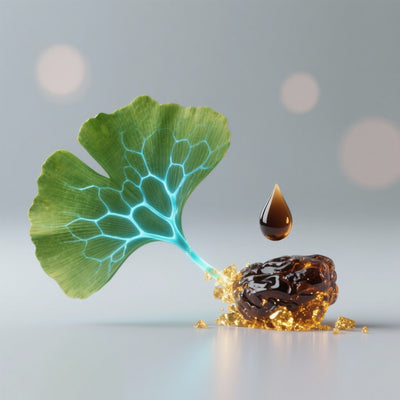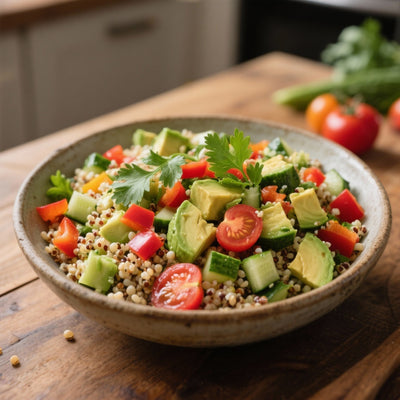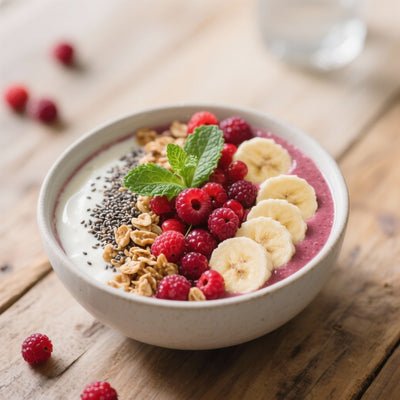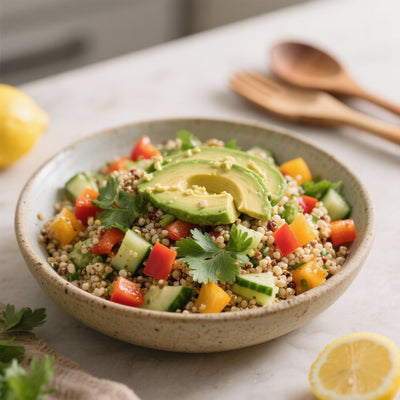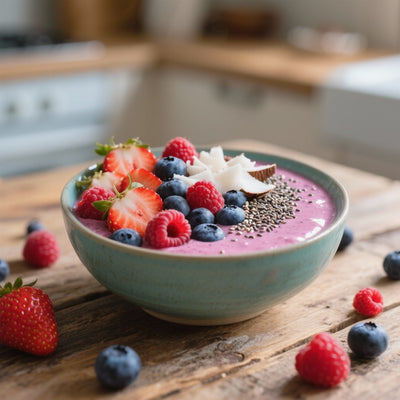12 mistakes that sabotage your beauty routine from the inside out
You invest in expensive serums, follow a multi-step skincare routine, and yet your skin still looks dull, tired, or prone to blemishes. Frustrating, isn't it? The truth is, the most beautiful skin isn't created solely in the bathroom. It's cultivated from within. Many daily habits, often unsuspected, can sabotage all your external efforts.
What we eat, our stress levels, the quality of our sleep... all of these have a direct and powerful impact on the radiance of our complexion. In this article, we'll uncover the 12 most common mistakes that are ruining your beauty from within. Get ready to transform your skin by adopting a holistic and truly effective approach.
1. Insufficient hydration: more than just thirst
This is the simplest piece of advice, yet the most often overlooked. Thinking that hydration is simply about drinking when you're thirsty is a fundamental mistake. Thirst is already a sign of dehydration. For your skin, constant hydration is crucial. Every skin cell needs water to function optimally, to regenerate, and to maintain its elasticity. Skin that's dehydrated from within appears dry and tight, and dehydration lines become much more visible.
"Proper hydration is the non-negotiable foundation of any beauty routine. It improves blood circulation to the skin, thus providing it with more nutrients and oxygen for a natural glow."
The solution: Aim for 1.5 to 2 liters of water per day, sipping it throughout the day. Consider herbal teas, broths, or water infused with cucumber and mint for variety. Your skin will thank you with its renewed elasticity and radiance.
2. Sugar, the sworn enemy of collagen
Sweets and refined carbohydrates may be comforting, but they are true enemies of youthful skin. Excessive sugar consumption triggers a process called glycation . In short, sugar molecules attach to skin proteins, primarily collagen and elastin, which are responsible for its firmness and elasticity. These "caramelized" proteins become rigid and brittle, accelerating the appearance of wrinkles and sagging skin.
The solution: Limit added sugars, sodas, pastries, and ultra-processed foods. Opt for the natural sugars found in whole fruits, which are rich in fiber and antioxidants. For healthy snack ideas, explore our wellness recipes .
3. Neglecting healthy fats: starved skin
In the quest for a healthy diet, fats have often been demonized. This is a serious mistake for your skin's health. Essential fatty acids, such as omega-3 and omega-6, are fundamental components of our skin cell membranes. They strengthen the hydrolipidic barrier, the protective layer that retains moisture and protects against external aggressors. A lack of healthy fats results in dry, irritated, and inflamed skin.
The solution: Incorporate quality sources into your diet: avocados, walnuts, flax seeds, chia seeds, and oily fish like salmon or sardines. A tablespoon of rapeseed or walnut oil in your salad dressing is a simple and effective step.
4. Lack of sleep: when fatigue shows on your face
It's not called "restorative sleep" for nothing. It's during the night that your skin switches into intensive regeneration mode. Collagen production increases, microcirculation is activated to repair the day's damage (UV rays, pollution), and cells renew themselves. Insufficient or poor-quality sleep disrupts this process. The result? A dull complexion, pronounced dark circles, and skin that struggles to defend itself against oxidative stress.
The solution: Aim for 7 to 9 hours of sleep per night. Create a relaxing bedtime ritual: read a book, take a warm bath, and avoid screens for at least an hour before bedtime. For more tips, check out our lifestyle blog .
5. Chronic stress: a silent inflammation
Stress doesn't just affect your mood; it shows on your face. When you're stressed, your body produces cortisol, the "stress hormone." In excess, cortisol promotes inflammation throughout the body, including the skin. This can exacerbate conditions like acne, eczema, or psoriasis. Furthermore, it can break down collagen and accelerate skin aging. Have you ever noticed a breakout before an important event? That's cortisol in action.
The solution: Incorporate stress management techniques into your daily routine: meditation, yoga, deep breathing, walking in nature. Even 10 minutes a day can make a significant difference to your skin and overall well-being.
6. A diet low in antioxidants
Your skin is constantly under attack from free radicals, unstable molecules generated by UV rays, pollution, or even normal metabolism. These free radicals damage cells and accelerate aging. Your best defenders? Antioxidants. They neutralize these aggressors before they can cause damage. A diet lacking them leaves your skin defenseless.
The solution: Eat the rainbow! Colorful fruits and vegetables are packed with antioxidants. Think berries, leafy greens (spinach, kale), peppers, tomatoes... Green tea and dark chocolate (over 70%) are also excellent sources.
7. Ignoring your gut health (the skin's second brain)
The gut-skin axis is a fascinating and increasingly recognized area of research. An imbalance in the gut microbiota (the billions of bacteria that populate your intestines) can lead to systemic inflammation that manifests on the skin as acne, rosacea, or eczema. A healthy gut means better absorption of essential nutrients for your skin.
A study published in the Journal of Clinical and Aesthetic Dermatology showed a direct correlation between gut health and skin clarity.
The solution: Consume foods rich in probiotics (kefir, plain yogurt, sauerkraut) and prebiotics (garlic, onion, leek, banana), which nourish the good bacteria. Limit processed foods that disrupt this delicate balance.
8. Overconsumption of dairy products and processed foods
For some people, dairy products can be pro-inflammatory and stimulate sebum production, thus promoting acne. Similarly, ultra-processed foods, high in salt, unhealthy fats, and chemical additives, overload the body's detoxification system and can cause inflammation that affects skin quality.
The solution: Listen to your body. If you suspect a link between your dairy consumption and your skin problems, try reducing it for a few weeks to see if there's a difference. Always prioritize a diet based on whole, unprocessed foods.
9. Excessive alcohol and caffeine: hidden dehydrators
A glass of wine or a morning coffee is part of many people's routine. However, in excess, both are diuretics, meaning they cause your body, and therefore your skin, to lose water. Alcohol can also cause inflammation and dilate blood vessels, leading to redness and, over time, capillary rupture. The result is dull, dry, and prematurely aged skin.
The solution: Moderation is key. If you consume alcohol or coffee, be sure to compensate by drinking a large glass of water for each beverage. This helps counteract the dehydrating effect.
10. Lack of regular physical activity
Exercise doesn't just sculpt your body; it also beautifies your skin. Physical activity increases blood flow, which allows skin cells to better receive oxygen and essential nutrients. Furthermore, sweating is an excellent way to eliminate toxins. This "detox" effect and post-workout glow are not an illusion: they are the result of healthy, well-hydrated skin.
The solution: Find an activity you enjoy to help you stay consistent. Brisk walking, dancing, cycling, swimming... 30 minutes, 3 to 5 times a week, is enough to see benefits. Don't forget to thoroughly cleanse your skin after exercise to remove sweat and impurities.
11. Skipping essential vitamins and minerals
Certain micronutrients are true superstars for the skin. Not getting enough of them through your diet can leave your skin lacking the building blocks and protective elements it needs.
- Vitamin C: Essential for collagen production and a powerful antioxidant.
- Vitamin E: Protects cell membranes from oxidative damage.
- Zinc: Essential for healing and anti-inflammatory, very useful in cases of acne.
- Selenium: Another powerful antioxidant that preserves skin elasticity.
The solution: A varied and balanced diet generally covers these needs. Citrus fruits and bell peppers provide vitamin C, almonds and sunflower seeds vitamin E, and pumpkin seeds and legumes zinc. To learn more, browse our nutrient information blog .
12. Underestimating the impact of the environment
Even though this factor is external, our ability to counteract it comes from within. Air pollution, fine particles, and other environmental aggressors generate intense oxidative stress on the skin. Without a strong internal defense, these daily aggressions degrade the skin barrier, dull the complexion, and accelerate aging.
The solution: Strengthen your skin's defenses from within with a diet rich in antioxidants, as we discussed earlier. This internal shield will complement the action of your external protective skincare products.



